- More Americans agree with GOP on economic policy, crime and immigration policy, but Democrats have edge on several other issues
- Top problems facing the country
- Job ratings for Joe Biden, Kevin McCarthy, Chuck Schumer
Democrats hold edge on many issues, but more Americans agree with Republicans on economy, crime, immigration
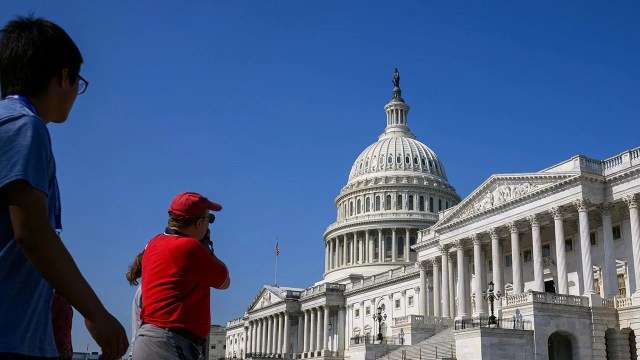
Pew Research Center conducted this study to better understand Americans’ views of the problems facing the country, Joe Biden’s job performance and more. For this analysis, we surveyed 5,115 adults from June 5-11, 2023. Everyone who took part in this survey is a member of the Center’s American Trends Panel (ATP), an online survey panel that is recruited through national, random sampling of residential addresses. This way nearly all U.S. adults have a chance of selection. The survey is weighted to be representative of the U.S. adult population by gender, race, ethnicity, partisan affiliation, education and other categories. Read more about the ATP’s methodology.
The public’s list of the top problems facing the nation includes inflation, health care affordability, drug addiction and gun violence.
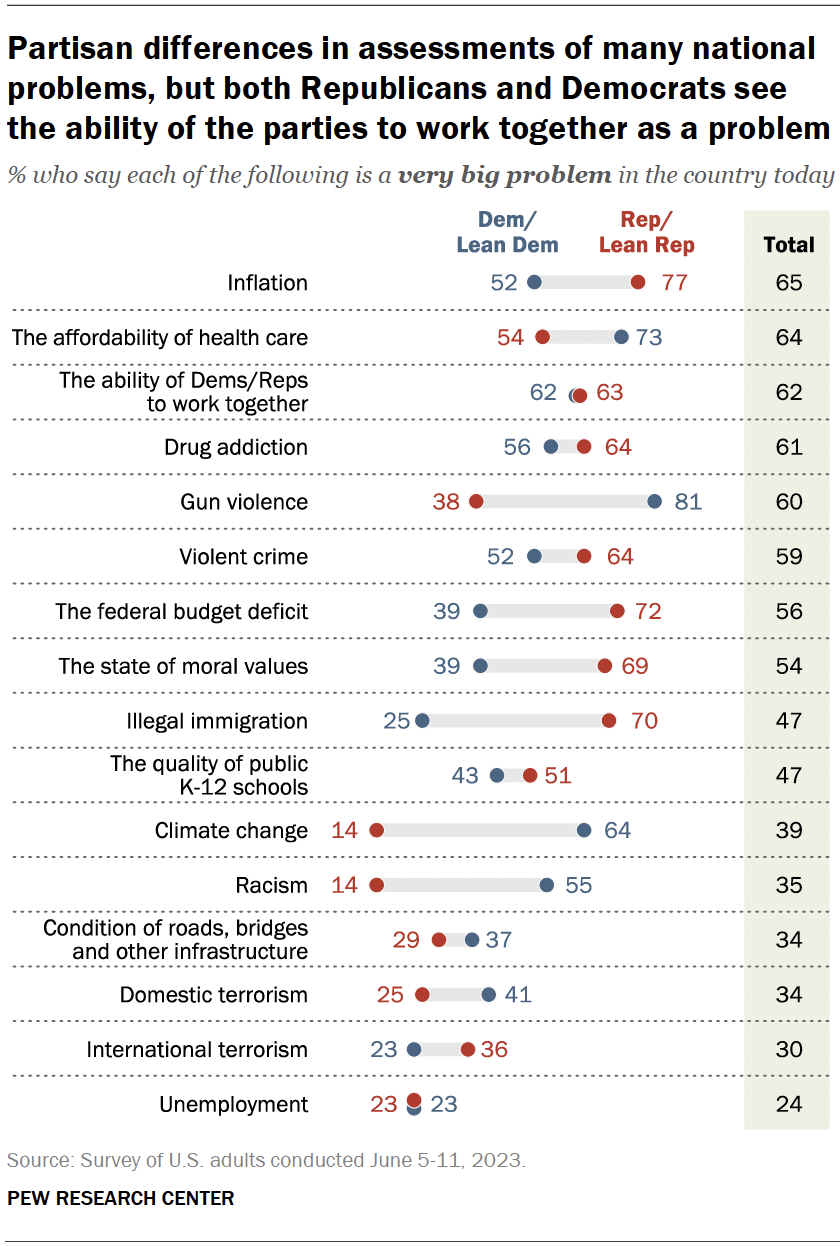
Yet the ability of Republicans and Democrats to work together rates about as high on the problems list as these other concerns. And it is one of the few, among 16 problems included, on which there is no partisan divide.
The Pew Research Center survey, conducted June 5-11 among 5,115 members of the Center’s nationally representative American Trends Panel, finds wide differences in perceptions of most national problems.
Inflation remains the top concern for Republicans and Republican-leaning independents, with 77% saying it is a very big problem. The state of moral values, illegal immigration and the budget deficit also are seen as top problems by at least two-thirds of Republicans.
For Democrats and Democratic leaners, gun violence is the top concern, with about eight-in-ten (81%) saying it is a very big problem. The affordability of health care ranks second (73% say this).
Democrats are more than four times as likely as Republicans to say that climate change is a very big problem in the country (64% vs. 14%). Democrats are also much more likely to say gun violence and racism are very big problems.
By contrast, Republicans are more than twice as likely as Democrats to say that illegal immigration is a very big problem (70% vs. 25%). They are also about 30 percentage points more likely than Democrats to say that the state of moral values and the budget deficit are very big problems.
Among the other findings from the new survey:
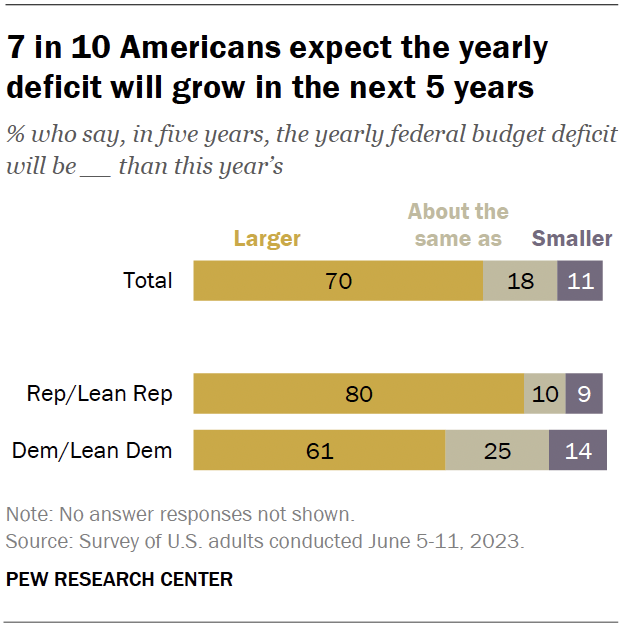
Most Americans expect the budget deficit to grow larger. The share of Americans who rate the budget deficit as a very big national problem has risen modestly since last year, from 51% to 56%.
Relatively few Americans expect the deficit to be lower in coming years: 70% say that, in about five years, it will be larger than it is today; 18% expect it to be about the same size as it is today, while just 11% say it will be smaller.
Democrats have sizable advantages on climate, health care policy; Republicans lead on economy, crime, immigration. The public is more likely to say they agree with the Democratic Party on a number of issues, including abortion policy, health care policy and climate change policy.
However, the Republican Party holds a 12-point advantage on economic policy: 42% say they agree with the GOP, 30% say they agree with the Democratic Party. The GOP holds similar leads on crime and immigration.
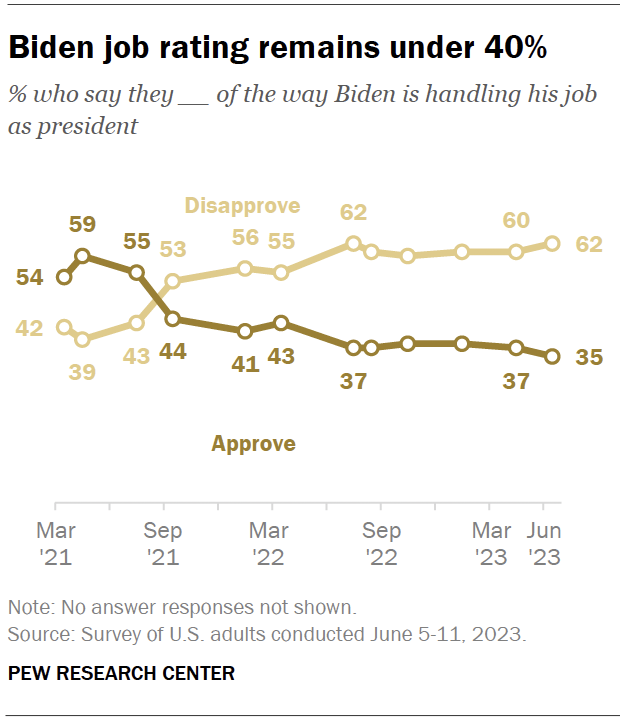
Biden job approval little changed. Currently, 35% of Americans approve of President Joe Biden’s job performance, while 62% disapprove. Biden’s job approval has changed little in the past year. The survey also finds low job ratings for House Speaker Kevin McCarthy (34% approve) and Senate Majority Leader Chuck Schumer (32%).
Please visit detailed tables for a current view of Biden’s approval rating among subgroups.
More Americans agree with GOP on economic policy, crime and immigration policy, but Democrats have edge on several other issues
About four-in-ten Americans (41%) say they agree with the Democratic Party on climate change policy, while substantially fewer (27%) agree with the GOP; nearly a third (31%) say they agree with neither party.
The Democrats’ advantage is similar on abortion policy and health care policy (12 points each).
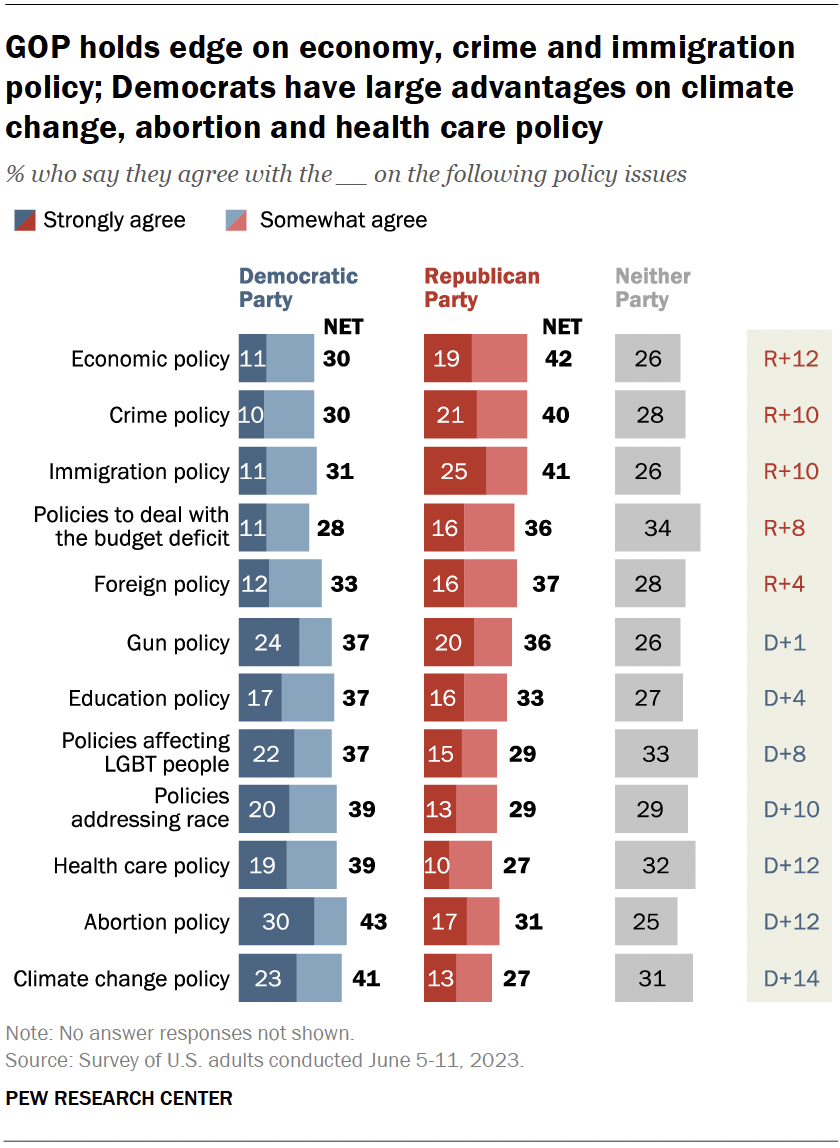
Republicans hold advantages on policies addressing the economy (12 points), crime (10 points), immigration (10 points) and the budget deficit (8 points).
Neither party has a significant edge on education policy, gun policy or foreign policy.
For the most part, the shares agreeing with each party on issues has not changed much over the past year.
However, the GOP’s 10-point advantage on immigration policy represents a shift since last July, when roughly equal shares of Americans say they agreed with each party (38% agree with GOP, 37% agree with Democrats).
In addition, while Democrats hold an 8-point advantage on policies affecting LGBT people (37% agree with the Democratic Party, 29% with the GOP and 33% with neither party), this is narrower than Democrats’ 20-point lead last July.
Top problems facing the country
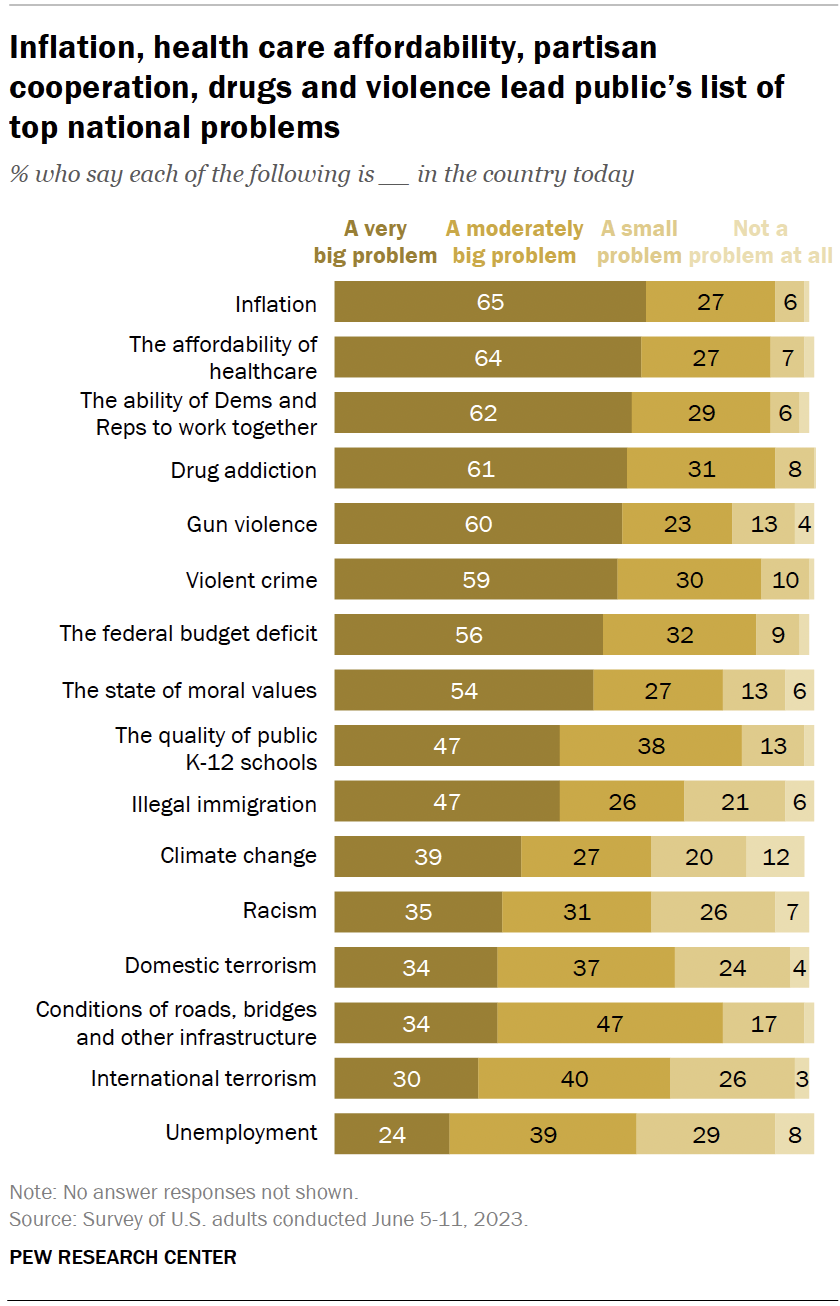
Majorities of Americans say 8 of the 16 issues included on the survey are “very big problems” facing the country. These range from economic concerns, such as inflation, affordability of health care and the budget deficit, to drug addiction, gun violence and violent crime.
Majorities also view the ability of Democrats and Republicans to work together (62%) and the state of moral values (54%) as very big national problems.
The share saying health care affordability is a very big problem is up 9 percentage points since May 2022, when 55% said this. The shares saying that gun violence and violent crime are very big problems have also increased since last year (by 9 percentage points and 5 points respectively).
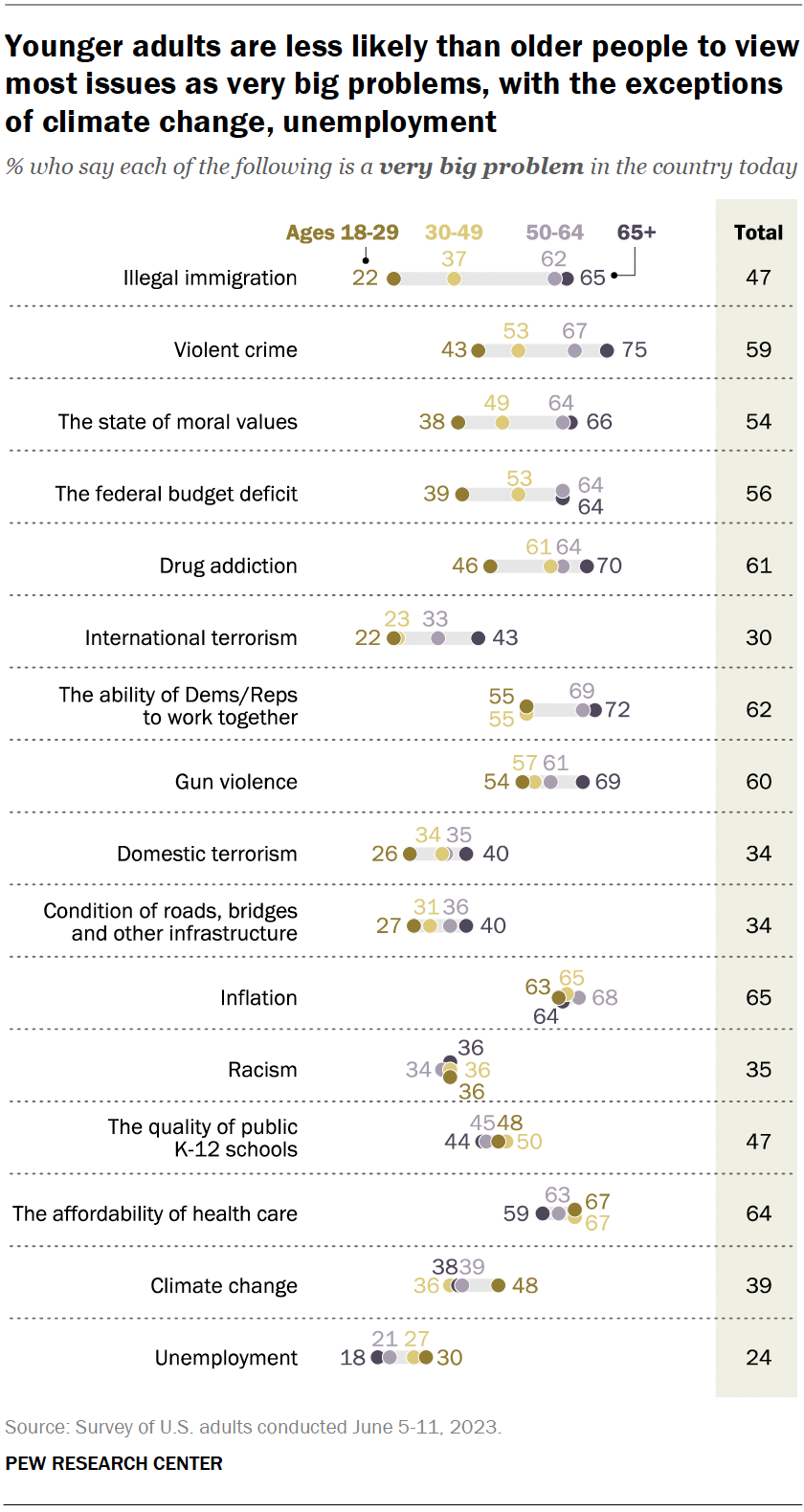
Racism, domestic and international terrorism, unemployment, and the condition of infrastructure rate lower on the public’s list of very big national problems. Still, for these and other issues asked about on the survey, majorities rate each as at least moderately big problems.
Older Americans remain more likely than younger Americans to say that a number of issues are very big problems in the country today. The starkest example of this is on illegal immigration: About two-thirds of adults ages 65 (65%) and over say that illegal immigration is a very big problem today. Around two-in-ten (22%) of adults under the age of 30 say the same.
However, this pattern is reversed on climate change. About half of adults ages 18-29 (48%) say that it is a very big problem, while 38% of adults ages 65 and over (and a similar share of adults 30-64) say this.
Job ratings for Joe Biden, Kevin McCarthy, Chuck Schumer
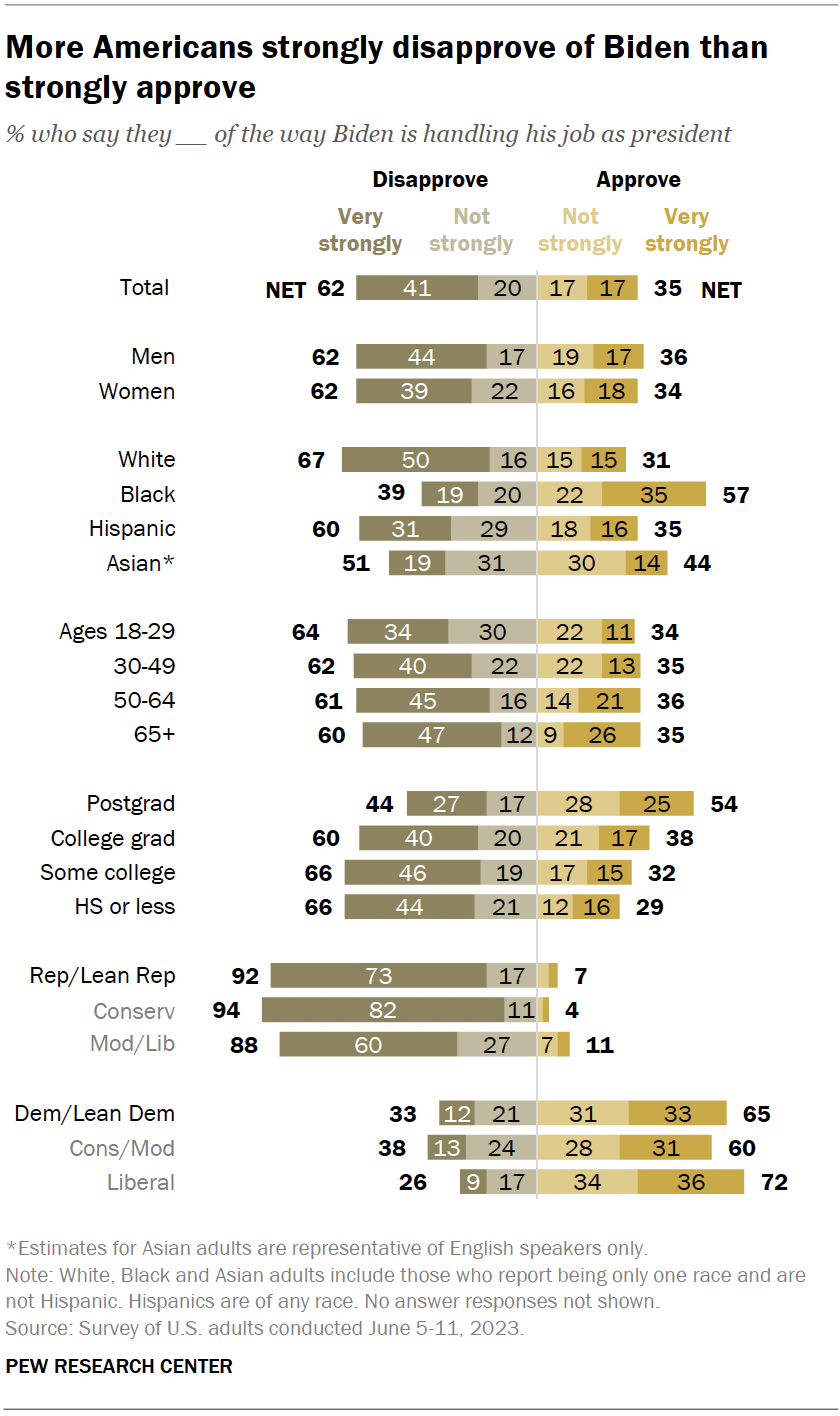
A majority of the public (62%) say they disapprove of Joe Biden’s job performance as president, with 41% who strongly disapprove. A much smaller share (35%) say they approve of Biden’s job performance, with only 17% who strongly approve.
Black adults are the only racial or ethnic group in which a majority says they approve of Biden’s job in office (57%). About half of Asian adults (51%) and six-in-ten Hispanic adults say they disapprove of Biden’s job performance.
Two-thirds of White adults (67%) say they disapprove of Biden’s job performance, including half who strongly disapprove.
While majorities across all age groups disapprove of Biden’s job performance, the share saying they strongly disapprove is much higher among adults ages 65 and over (47%) than those under 30 (34%).
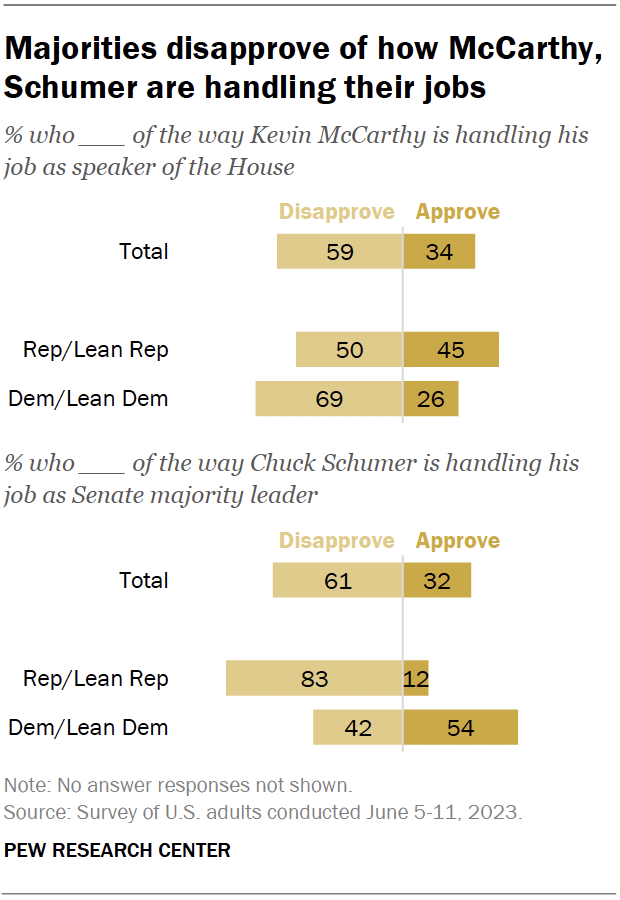
Roughly two-thirds of Democrats and Democratic-leaning independents (65%) approve of Biden’s job performance, with a third strongly approving. An overwhelming majority of Republicans and Republican leaners disapprove (92%); nearly three-quarters (73%) strongly disapprove.
Please visit detailed tables for Biden’s approval rating among additional subgroups.
The job ratings for House Speaker Kevin McCarthy (34% approve) and Senate Majority Leader Chuck Schumer (32% approve) are comparable to Biden’s. Both congressional leaders get fairly mixed ratings from members of their own party and largely negative ratings from the opposing party.